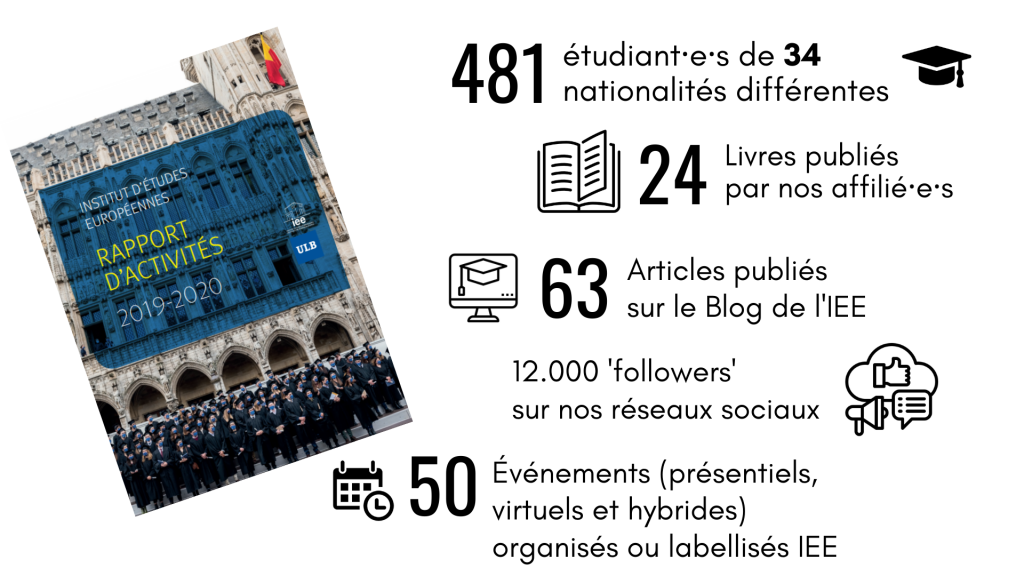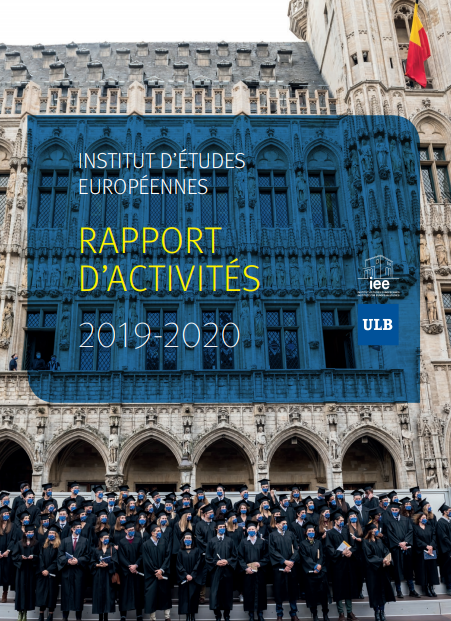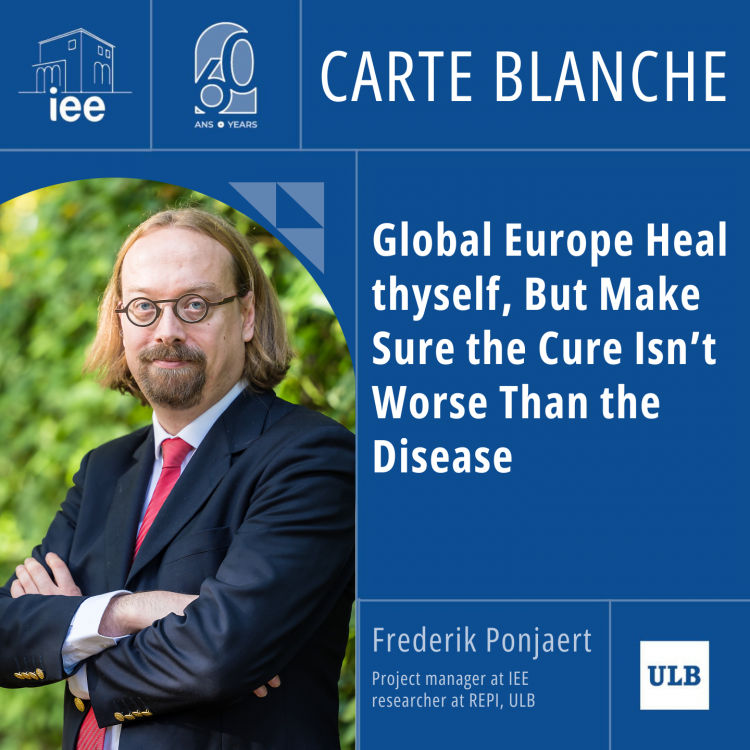The underlying trends brought to the surface
The 2019-2020 academic year will be marked by the COVID-19 pandemic for a long time. The health measures taken to contain the spread of the virus have had a profound impact on Europe but also on university life and on the Institute of European Studies. While crisis management was one of the central themes that shook Europe and the world, we should remember the continuity of the many European challenges but also the continuation of the Institute’s scientific and teaching activities.
The start of the 2019-2020 academic year was also an opportunity to commemorate another European upheaval, thirty years since the fall of the communist regimes in Central and Eastern Europe. The IEE opened its academic year on December 6, 2019, with a lecture by Professor Jan Zielonka (Oxford University) questioning the legacies of 1989 and the challenges ahead for European governance. From this point of view, the past year has been rich in events for the European Union, such as the installation of the new European Commission, headed for the first time by a woman, the continuation and the conclusion of the Brexit, debates on the rule of law, positions taken following the elections in Belarus, the idea of a European minimum wage or even climate-related ambitions.
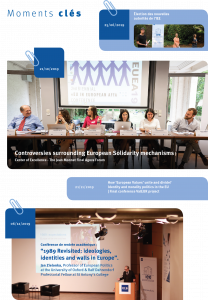
As in many aspects of social life, the health crisis has had the effect of bringing to the surface some underlying trends that are running through our societies. The difficult European coordination of health measures and travel restrictions once again seemed to demonstrate the impossibility of developing a common European position. Many academic members of the IEE took part in the public debate, either to highlight the dangers of an intergovernmental EU, or to call for a new European patriotism and greater solidarity. Faced with this quickly established observation, it is possible to observe a potential European recovery, in particular with regard to the agreement of the European Council of July 21, 2020 on the long-term European budget and the Next Generation Europe recovery plan.
An interdisciplinary analysis of European issues
These multiple challenges and perspectives have been at the heart of the IEE’s research and teaching as evidenced by several works published by members of the IEE, and in particular:
- As part of the Jean Monnet Center of Excellence project led by the IEE from 2016 to 2019, the publication by Larcier editions of the book “Les solidarités européennes : entre enjeux, tensions et reconfigurations”, co-edited by Ramona Coman, Louise Fromont and Anne Weyembergh
-
Governance and Politics in the Post-Crisis European Union co-edited by Ramona Coman, Amandine Crespy and Vivien A. Schmidt, a new original textbook published in 2020 by Oxford University Press that delivers a much-needed update on how policies and EU institutions have changed in light of the multiple crises and transformations since 2010.
-
One of the four books coming to the end of the GEM-STONES project, of which the IEE is the coordinator, entitled “Supranational Governance at Stake. The EU’S External Competences Caught between Complexity and Fragmentation,” edited by Mario Telò and Anne Weyembergh, in July 2020 at Routledge editions.
Conferences, seminars and study days organized face-to-face or remotely:
Around European values, on November 21-23, 2019, the ARC ValEUR project’s final conference was held under the title “How‘ European values ’unite or divide”.
Around Brexit, we will highlight in particular the coordination by the IEE, the ULB and the United Kingdom’s Mission to the EU of the Conference on future relations between the UK and the EU, given by David Frost CMG, British Prime Minister’s adviser for Europe and chief negotiator, on February 17, 2020.
New formats for a new reality
The formats of scientific activities and contributions have also been revisited, as evidenced in particular by the series of podcasts launched by the Jean Monnet OpenEUDebate network of which the IEE-ULB is a member, in order to analyze how citizens and academics can contribute to the debate. on COVID-19 and its impact on the future of Europe.
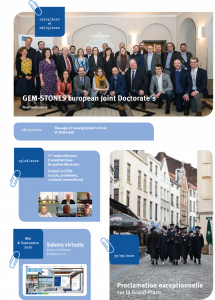
A Brussels-Montreal transatlantic webconference entitled “Evaluating CETA: achievements, problems and international context” organized by the IEE in partnership with the Embassy of Canada, in June 2020, offered a first exchange between European and Canadian academics on the achievements, the problems and the international context of the Global Economic and Trade Agreement between the European Union and Canada (CETA). The economic, trade and legal dimensions of the agreement, as well as its place in the context of the global trade crisis and COVID-19 provided the framework for this interdisciplinary discussion.
Finally, several summer schools took place this summer with adaptations to health conditions:
On August 27-29, the IEE organized, in collaboration with the Continuing Education Center of the Faculty of Philosophy and Social Sciences, in hybrid format, a summer school focusing on the capacity of regional and international organizations to manage health crisis. A rich and stimulating dialogue was offered to the fifty participants who were able to interact with representatives of the European Commission and of the German Presidency of the Council of the EU, the Council of Europe, NATO, the Office from the African, Caribbean and Pacific Group of Countries, the United Nations and the World Health Organization. Participants from more than ten EU Member States and third countries also benefited from a mentoring session on career opportunities in European and international professional settings.
Among the objectives of the new IEE management team was the desire to organize cultural events related to European issues. As such, a projection-debate session around the film Adults in the Room by Costa-Gavras took place in the presence of the director at the Galeries cinema on December 12, 2019. Other projects could not see the light of day due to the Spring 2020 lockdown, like the conference organized around the performance of The Quest by Cédric Eeckhout, originally planned for May 9, 2020 at the National Theater (and postponed to May 8, 2021) or the arrival of Jonathan Coe for his book Middle England.
A disrupted, but still active, student life
In 2019-2020, the IEE had the honor to announce its 57th class of graduates in the majestic setting of the Grand Place in Brussels. Students from the Institute chose to honor Maltese journalist Daphne Anne Caruana Galizia by naming their class after the journalist, murdered for her fight against corruption.
Throughout this academic year, the IEE has continued its close collaboration with its two student associations: Eyes on Europe and SAIES. The members of these two associations participated in discussions and debates on European issues and challenges by regularly inviting personalities from European political and academic circles to the IEE. More importantly, SAIES and Eyes on Europe make a fundamental contribution to the socialization of European studies students sometimes in a difficult context of lockdown.
In 2019-2020, the Institute developed its mentoring activities aimed at all students in European studies, activities which were organized with the support of the Fonds d’encouragement à l’enseignement.
Studying at the IEE also means integrating into a community of Europeanists which is intended to continue after graduation. As part of the Thematic Year “Europe of knowledge”, a book paying tribute to ULB alumni who have contributed to European integration was published in 2020.
Finally, this academic year 2019-2020 was the first of the new IEE directorial team which has not been spared by events. Nevertheless, this year allowed us to see the relevance of our choices in terms of educational and scientific innovation with the development of multimedia rooms made possible by obtaining a teaching incentive fund. If the development of IT tools allowing long-distance communication was consolidated, it also became more evident than ever our desire to make the Institute an essential place of socialization for students from various backgrounds. The IEE, like the European Union, must be a place of exchange and meeting contributing to the emergence of a true European citizenship.
Our thanks
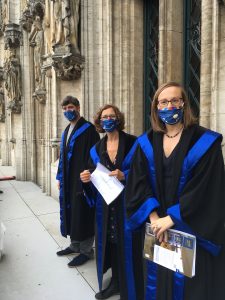
We express our gratitude to all those who have worked closely with us during this challenging year, whether they belong to the academic, scientific or administrative body. In particular, we would like to extend our thanks to all our scientific collaborators and our gratitude to the administrative staff of the IEE who, once again, were able to show their solidarity, adaptability and dedication in these difficult circumstances.
Finally, we take this opportunity to thank the authorities of our University, especially the Rector Yvon Englert and his team for their support during these last years.
We also welcome the election of the new Rector Annemie Schaus in September 2020 and the appointment of her team, with whom we look forward to forging fruitful collaborations in the coming years.
Thank you to everyone for your precious collaboration in 2019-2020!
Ramona Coman, Emmanuelle Bribosia and Nicolas Verschueren
November 9, 2020
Read theInstitute for European Studies of the ULB’s annual report
for the academic year 2019-2020 (in French)
